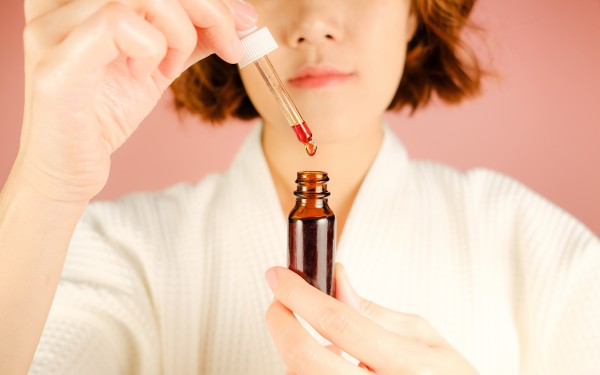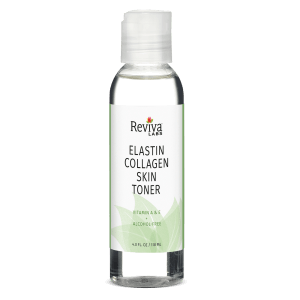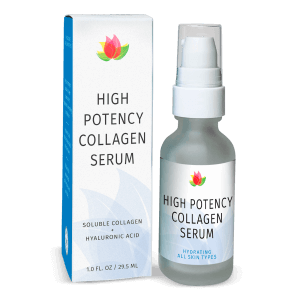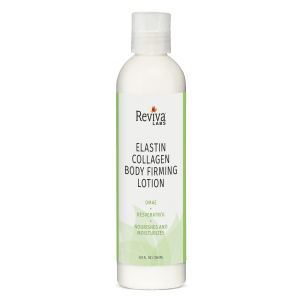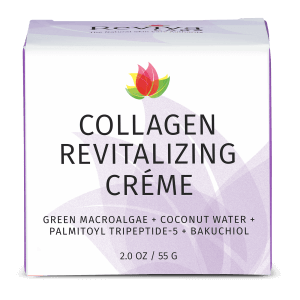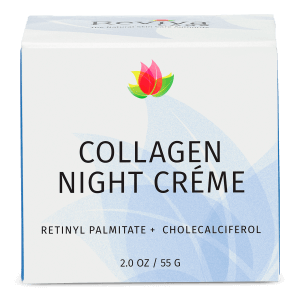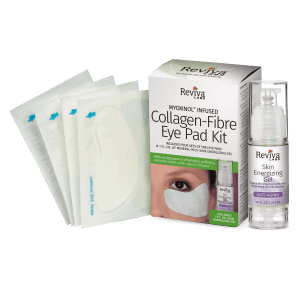Clean Beauty, Ingredients, Reviva Labs, Skin Care
Collagen lays the foundation for healthy looking skin
Collagen is the main structural protein comprising an enormous percentage of our bodies. It’s found in skin, tendons, ligaments, organs, bone, and more. Twenty-nine types of collagen have been identified, but collagen types one through five are the most abundant. And for our discussion, we’ll be concerned with type one which is found in the dermis of the skin.
It’s difficult to discuss skin care or anti-aging skin care without encountering collagen. This essential structural component of our skin is the “spongy” matrix that keeps our skin supple and plump. Sure, it doesn’t do this alone, but it is an essential part of the skin’s underlying framework.
As we age, starting in our early twenties, our ability to create and maintain collagen begins to decline. Losing collagen leads to thinning skin, sagging skin, and of course fine lines and wrinkles. Lifestyle choices and environmental factors can exacerbate collagen loss. Smoking, high sugar diets, and excessive exposure to the sun all hasten the loss or destruction of your natural collagen. Worse yet, for woman, menopause can contribute to a nearly 30% loss of collagen, which is certainly an undesirable situation.
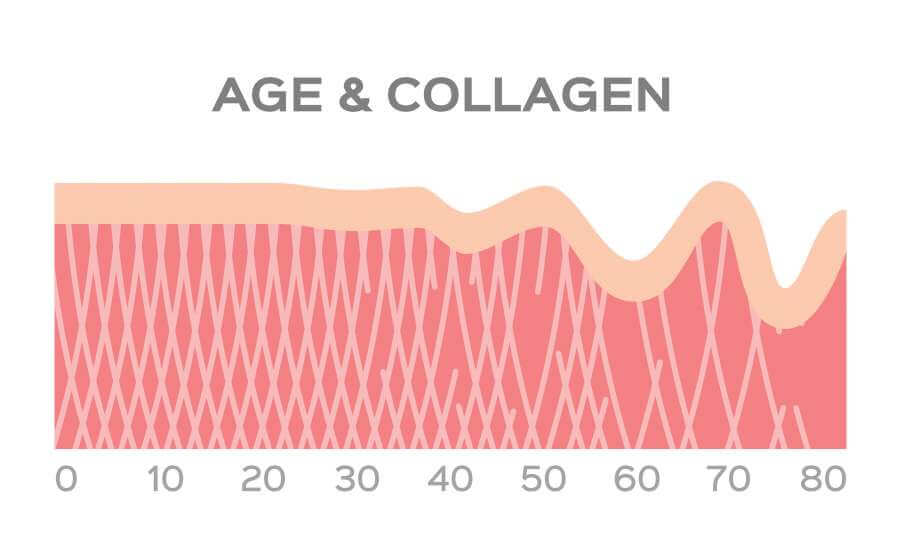
How can you replenish collagen
Experts debate the effectiveness of applying collagen topically. This is mainly because the unaltered collagen molecule is too large to penetrate the skin barrier. For the most part, this is accurate; insoluble collagen topically applied will sit on the skin. However, even in this unedited form, collagen is beneficial. Collagen is an excellent moisturizing element as it also helps to temporarily fill in fine lines and wrinkles, while improving the texture of the skin. So, even in its rudimentary form, collagen applied to the skin is beneficial.
But it’s accurate that, in order for collagen to be truly effective, it has to reach the deeper layers of the skin. This is where research has provided multiple opportunities. Soluble collagen is a “younger” version of collagen that lacks the full helix formation (i.e., non-cross linked) and therefore appears to be more absorbable. It’s also composed of more precursive collagen elements, adding “layers” of benefits during use. Hydrolyzed Collagen is collagen that has been processed and broken into smaller “chunks” reducing the molecule to a size that can penetrate the skin’s barrier. These amino acid / peptide pieces help deliver collagen components to the skin.
A combination of collagen, soluble collagen, and hydrolyzed collagen provides a comprehensive layered approach to rejuvenating your skin.
A combination of collagen, soluble collagen, and hydrolyzed collagen provides a comprehensive layered approach to rejuvenating your skin. You’ll find Reviva offers all three forms of collagen in a variety of products as we’re big proponents of layering to achieve a multi-dimensional approach to caring for your skin.
More science focused on boosting collagen
Replenishing collagen is not simply about adding collagen to your skin. In fact, many studies show there are more significant avenues for restoring or enhancing your own collagen levels. There are many preventative and restorative topical treatments you can utilize to counteract environmental or natural aging based collagen loss. There are many peptides that have demonstrated the ability to aid or boost in the production of collagen. Palmitoyl Tripeptide-3 (Matrixyl™) has become a staple in anti-aging skin care that desires to boost collagen. Similarly, Palmitoyl Tripeptide-5 (aka Syn-Coll™) is increasingly popular. Each cosmeceutical peptide targets various aspects of the collagen process to help improve overall results.
But you don’t need to seek out unique, new peptides. There are many time-tested ingredients that also show signs of encouraging collagen production, or that help offset collagen damaging factors. Vitamin C, a potent antioxidant, can help reverse the inflammation that contributes to collagen damage and has been shown to help in the production of collagen. Likewise, Retinol (derivatives of Vitamin A) also help to counteract the effects of collagen damage. And of course, you can choose to avoid collagen destroying culprits, such as UV rays, by wearing a sunscreen daily.
Maintain and replenish collagen
While studies exploring the overall effectiveness of topical collagen application continue, perhaps the smartest course of action is to approach protecting and/or mitigating your natural collagen loss with a multi-faceted approach. Eat healthy, avoid smoking, and always protect your skin from the sun. And for good measure, layer on a combination of insoluble, soluble, and hydrolyzed collagen products along with some antioxidants and collagen-boosting peptides.
But if you’re a bit skeptical, rest assured that clinical studies on various product ingredients do show benefits are found in products that contain collagen or collagen boosting ingredients. Moreover, over four decades of product testimonials and anecdotal evidence also present a good case for overall benefits. At the very least, you’ll protect your skin and keep it well hydrated and slathered in antioxidants, which isn’t a bad situation at all. But we think you’ll also experience the overall benefits of layering on collagen as well.
Related Readinghttps://mcb.asm.org/content/29/4/943.full
https://pubchem.ncbi.nlm.nih.gov/compound/Hydroxyproline
https://www.byrdie.com/collagen-4846440
https://intothegloss.com/2016/03/collagen-skin-care/
https://artofdermatology.com/role-collagen-skin-care/
https://www.cedars-sinai.org/blog/collagen-supplements.html
https://pubs.acs.org/doi/10.1021/acs.jpcb.9b05006
https://www.webmd.com/skin-problems-and-treatments/news/20191212/collagen-supplements-what-the-research-shows




